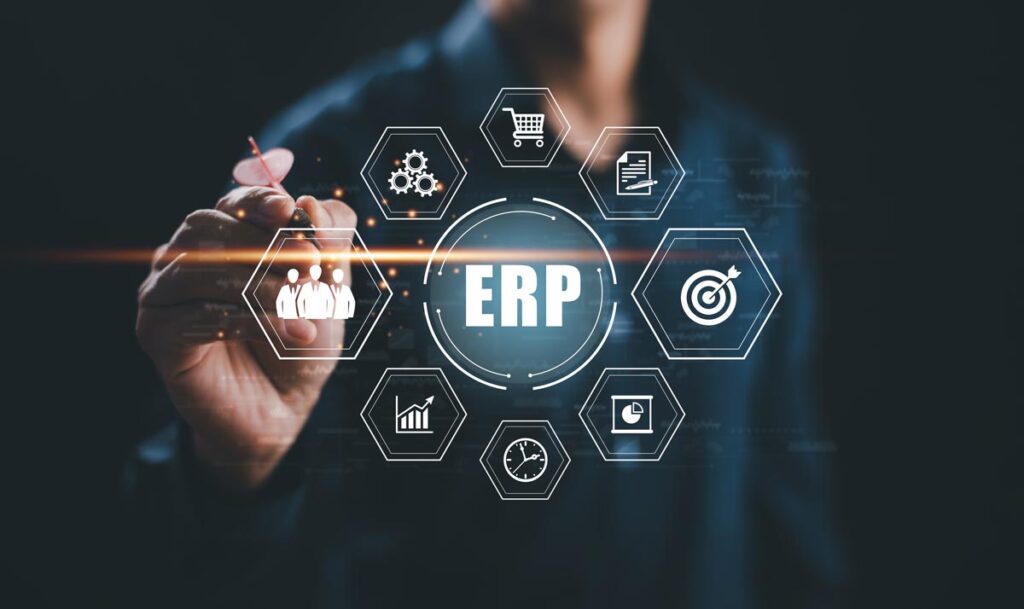
Understanding Cloud ERP
Enterprise Resource Planning (ERP) systems are the backbone of efficient business operations, integrating various functions into one unified system. Traditionally, businesses relied on on-premises ERP systems, which required extensive IT infrastructure and maintenance. However, with advancements in technology, many companies are shifting to cloud-based ERP systems.
What is Cloud-Based ERP?
Cloud ERP is an ERP solution that runs on a cloud service rather than being hosted on local servers. Unlike on-premise ERP solutions, which require businesses to manage hardware and software updates, cloud ERP vendors handle maintenance, updates, and security, providing a seamless experience.
These systems leverage Software as a Service (SaaS) to deliver functionality via an internet connection, allowing businesses to access their ERP system from anywhere. This flexibility has made cloud ERP implementation a popular choice for manufacturers looking to streamline their business processes.
Advantages of Cloud ERP
Switching to cloud ERP brings several benefits, from cost savings to enhanced performance. Here are some key advantages of cloud ERP:
1. Reduced IT Costs
With cloud ERP, businesses don’t have to invest in expensive hardware or dedicate IT teams to manage servers. The cloud service provider handles all updates and maintenance, reducing operational costs.
2. Improved Data Security
Many manufacturers worry about data security, but cloud ERP vendors use secure data centers with robust encryption, firewalls, and multi-factor authentication to protect sensitive business information.
3. Scalability and Flexibility
Unlike on-premises ERP systems, cloud-based solutions scale with your business. Whether you’re a small manufacturer or a large enterprise, you can add features and users as needed, making it a cost-effective long-term solution.
4. Enhanced Collaboration and Accessibility
Since cloud-based ERP systems are accessible from any location with an internet connection, teams can collaborate seamlessly across different locations, improving overall business functions.
5. Faster Implementation
Traditional ERP implementation can take months or even years. Cloud ERP implementation is generally faster, allowing businesses to start using the system sooner and gain value more quickly.
How Cloud ERP Impacts Business Processes

Supply Chain Management
Manufacturers rely on supply chain management to optimize production and distribution. Cloud ERP provides real-time visibility into inventory levels, supplier performance, and order tracking, enabling businesses to respond quickly to changes.
Inventory Management
Managing inventory efficiently is crucial for manufacturers. Cloud ERP integrates inventory management with procurement, sales, and production, ensuring optimal stock levels and reducing waste.
Customer Relationships and Service
A well-implemented cloud ERP solution enhances customer relationships by integrating customer data, order history, and support requests into one platform. This allows customer service teams to respond promptly and effectively.
Cloud ERP vs. On-Premise ERP Solutions
While on-premise ERP solutions have been the norm for decades, cloud-based ERP systems offer more flexibility and lower costs. Here’s a quick comparison:
| Feature | Cloud ERP | On-Premise ERP |
| Implementation | Quick and easy setup | Lengthy installation |
| Maintenance | Handled by the vendor | Requires in-house IT |
| Data Security | Secure data centers | Localized security |
| Scalability | Highly scalable | Limited by infrastructure |
| Cost | Subscription-based pricing | High upfront costs |
Selecting the Right Cloud ERP Vendor
Choosing the right cloud ERP vendor is crucial for a successful ERP implementation. Consider the following when evaluating vendors:
- Industry Expertise: Ensure the vendor understands business processes specific to manufacturing.
- Data Security Measures: Look for providers with secure data centers and compliance certifications.
- Customization Options: The ERP system should be customizable to match your business functions.
- Customer Support: Reliable support ensures smooth cloud ERP implementation and ongoing success.
- Total Cost of Ownership: Compare costs, including licensing fees, training, and integration expenses.
Future of Cloud ERP in Manufacturing
The cloud ERP market is growing rapidly, with manufacturers embracing digital transformation to stay competitive. Advancements in AI, IoT, and automation are expected to enhance cloud ERP benefits, making systems smarter and more intuitive.
By adopting cloud-based ERP systems, manufacturers can streamline operations, improve decision-making, and future-proof their businesses in an evolving digital landscape.
The Bottom Line
Cloud ERP is revolutionizing the way manufacturers manage their business operations. By offering cost efficiency, scalability, and enhanced security, it provides a powerful alternative to on-premise ERP solutions. Whether you’re looking to improve inventory management, customer relationships, or supply chain management, implementing the right cloud ERP solution can drive success for your manufacturing business.
As the cloud ERP market continues to evolve, staying ahead with the latest ERP solution can help manufacturers gain a competitive edge in today’s fast-paced industry.
